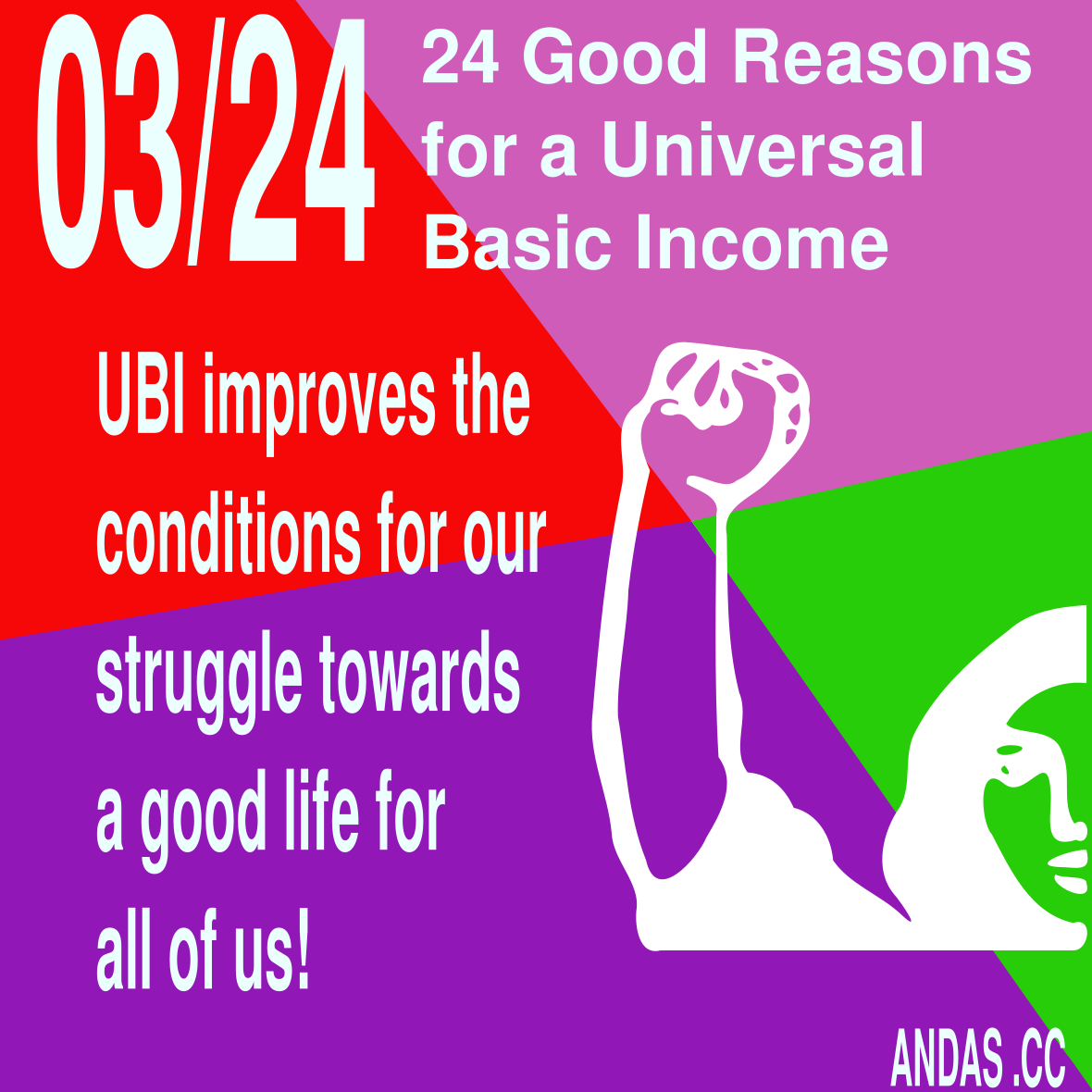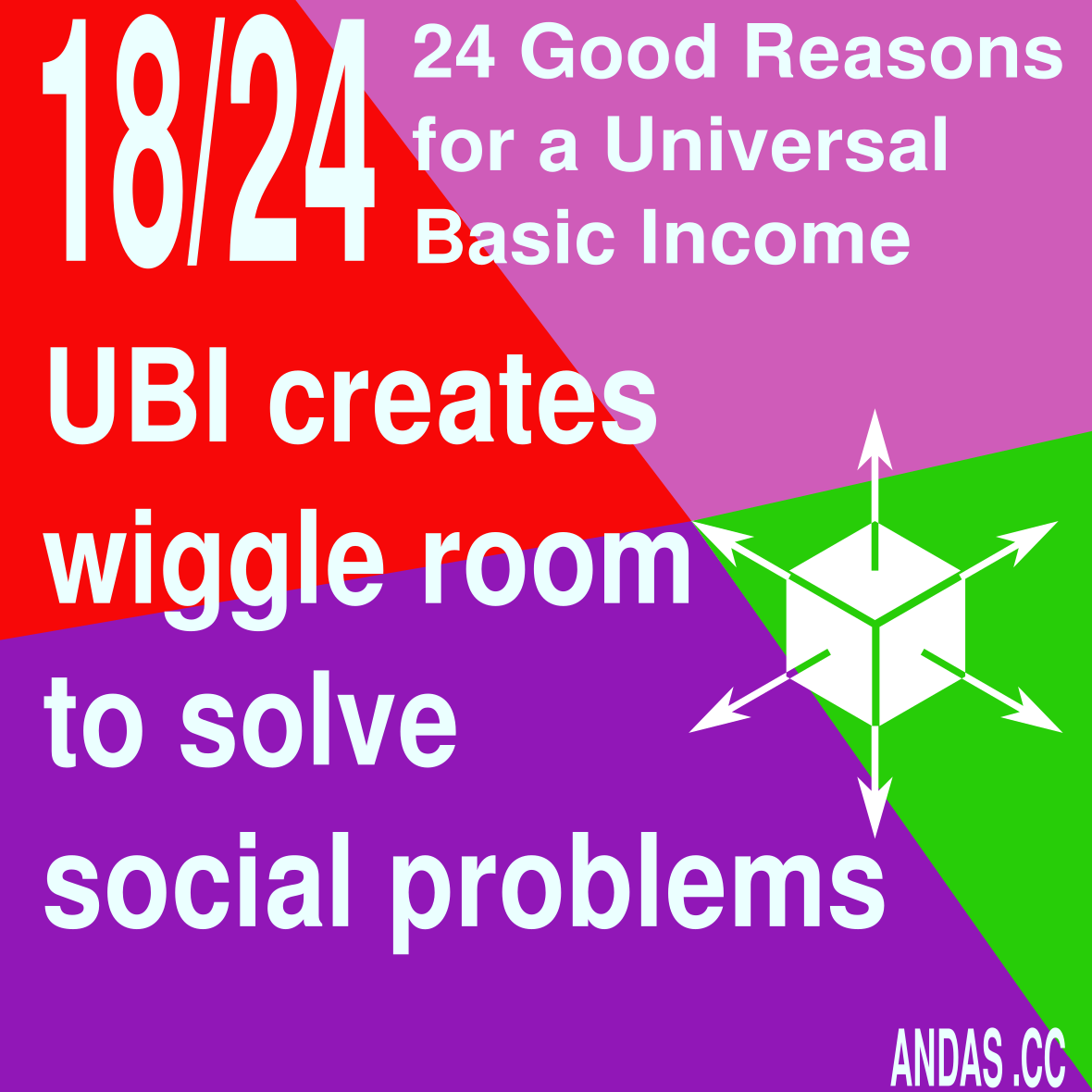24 Good Reasons Why We Need A Universal Basic Income (UBI)
01 UBI Enables the Solidarity Economy
Today, we’re exploring an intriguing concept: how a Universal Basic Income (UBI) could fuel a solidarity economy.
Now, you might be wondering, what exactly is a solidarity economy? It’s an economic model that prioritizes social and environmental well-being over profits. Think worker cooperatives, fair trade practices, and ethical consumption. It’s about people working together for the greater good.
Our focus today stems from the idea that a UBI could empower more individuals to engage in non-profit and community-driven projects. Imagine a world where everyone could dedicate their time and skills to initiatives they’re passionate about, without financial constraints.
Think about the incredible contributions people already make in this space. We have dedicated Wikipedia editors, brilliant free software developers, tireless social workers, and creative designers sharing their skills and expertise. These individuals are driven by a sense of purpose and enjoyment, often achieving results that surpass those of commercially driven ventures.
The problem is, not everyone can afford to pursue their passions and contribute to these meaningful projects. Many are stuck in unfulfilling jobs just to make ends meet. This is where a UBI comes into play.
By providing a financial safety net, a UBI could liberate individuals from the pressure of solely profit-driven work. It would empower them to dedicate their time and energy to projects that benefit their communities and align with their values.
Imagine the possibilities! Collaborative projects, fueled by passion and shared purpose, could flourish. Since cooperation often trumps competition in terms of efficiency and innovation, a UBI-supported economy could potentially outperform a purely commercial one.
Take Wikipedia, for example. This collaborative, community-driven platform has revolutionized access to information, effectively displacing commercially produced encyclopedias. It’s a testament to the power of collective effort and a glimpse into what a UBI-powered solidarity economy could achieve.
It’s a thought-provoking concept, isn’t it? A world where individuals are empowered to contribute their unique skills and talents to initiatives that benefit society as a whole.
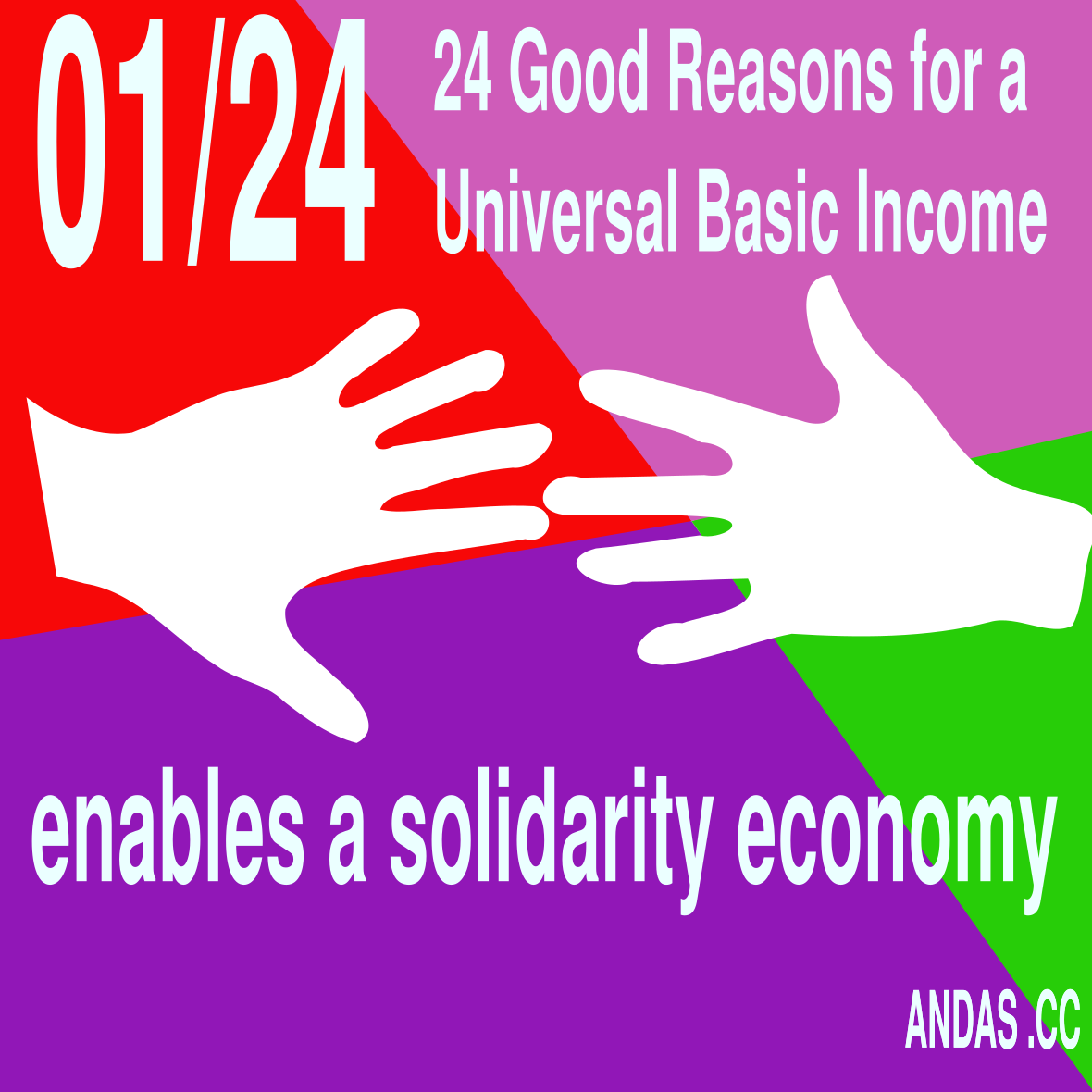
02 UBI helps against precarization and existential anxiety
The days when people had a fixed job for the rest of their lives are long gone. The world of work is constantly changing. That’s not always a bad thing, because people sometimes like to look for new challenges themselves, but very often people suffer from constant uncertainty. A company that is doing well today may be cutting jobs tomorrow. A location is relocated to the other side of the world from one day to the next. With the upheavals ahead of us due to digitalization, this will all get much worse. Employment relationships, even if uncertain, are often still a relative luxury: in the gig economy and platform capitalism, many of us have to fight our way from one job to the next.
Would a basic income eliminate precarious employment? No, but our lives would no longer be precarious: with a secure basic income, it would no longer be a problem if new orders were not received. Life would still be secure and without the pressure of existential fear we could perhaps also gain positive aspects from the required flexibility.
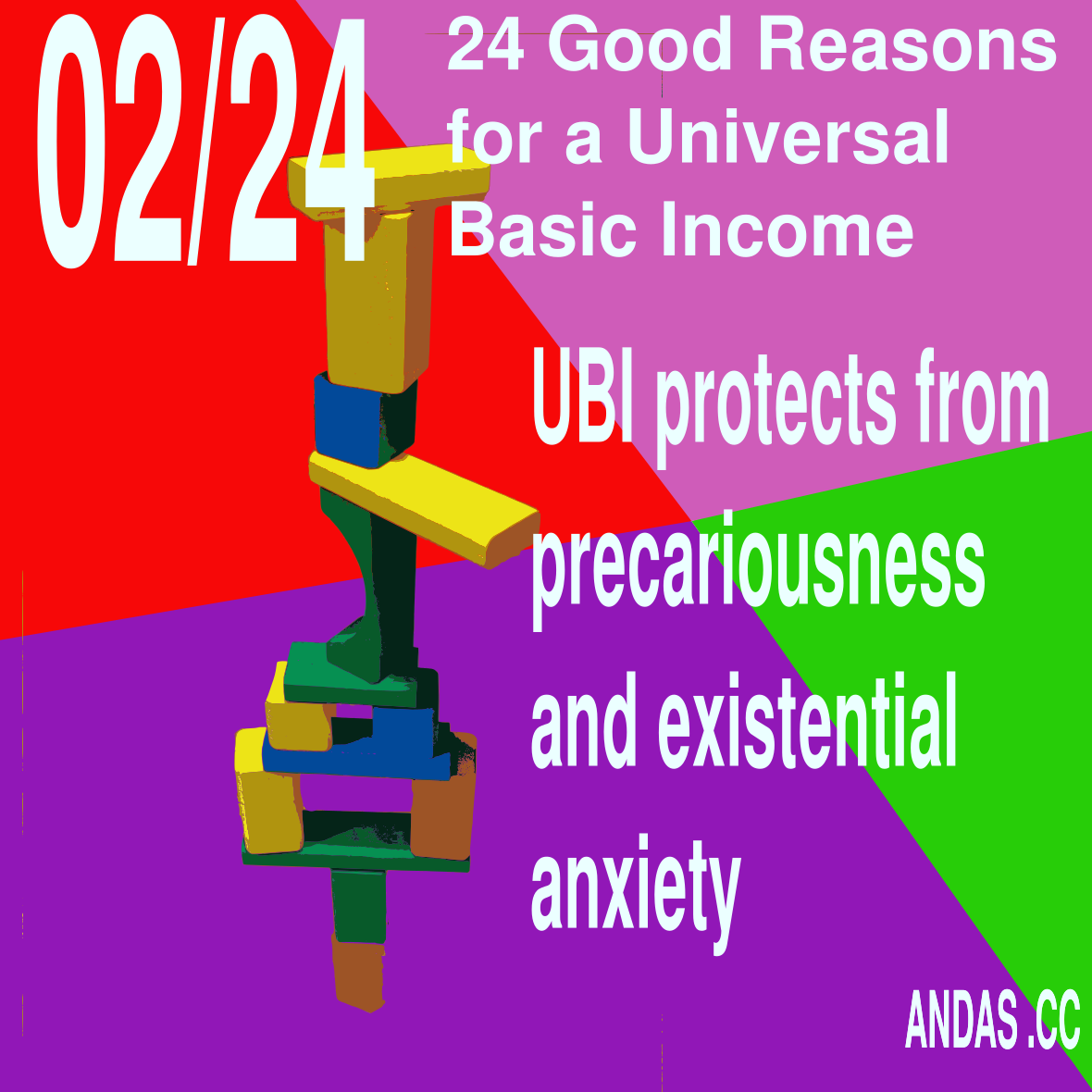
04 A UBI guarantees good working conditions
Basic income - guarantees good working conditions
With a sufficiently high basic income, we would all have the opportunity to quit a job that does not offer pleasant working conditions and that does not pay well enough. This means that companies would actually have to think about how to ensure that working conditions are pleasant. People would appear in companies with more self-confidence to address grievances and that would probably also help to enable more democratic participation in companies.
For this very reason, the demand for an unconditional basic income should also be a matter of course for trade unions. Ultimately, that would probably also be good for employers: those who enjoy working and are motivated by it are also more creative and productive.
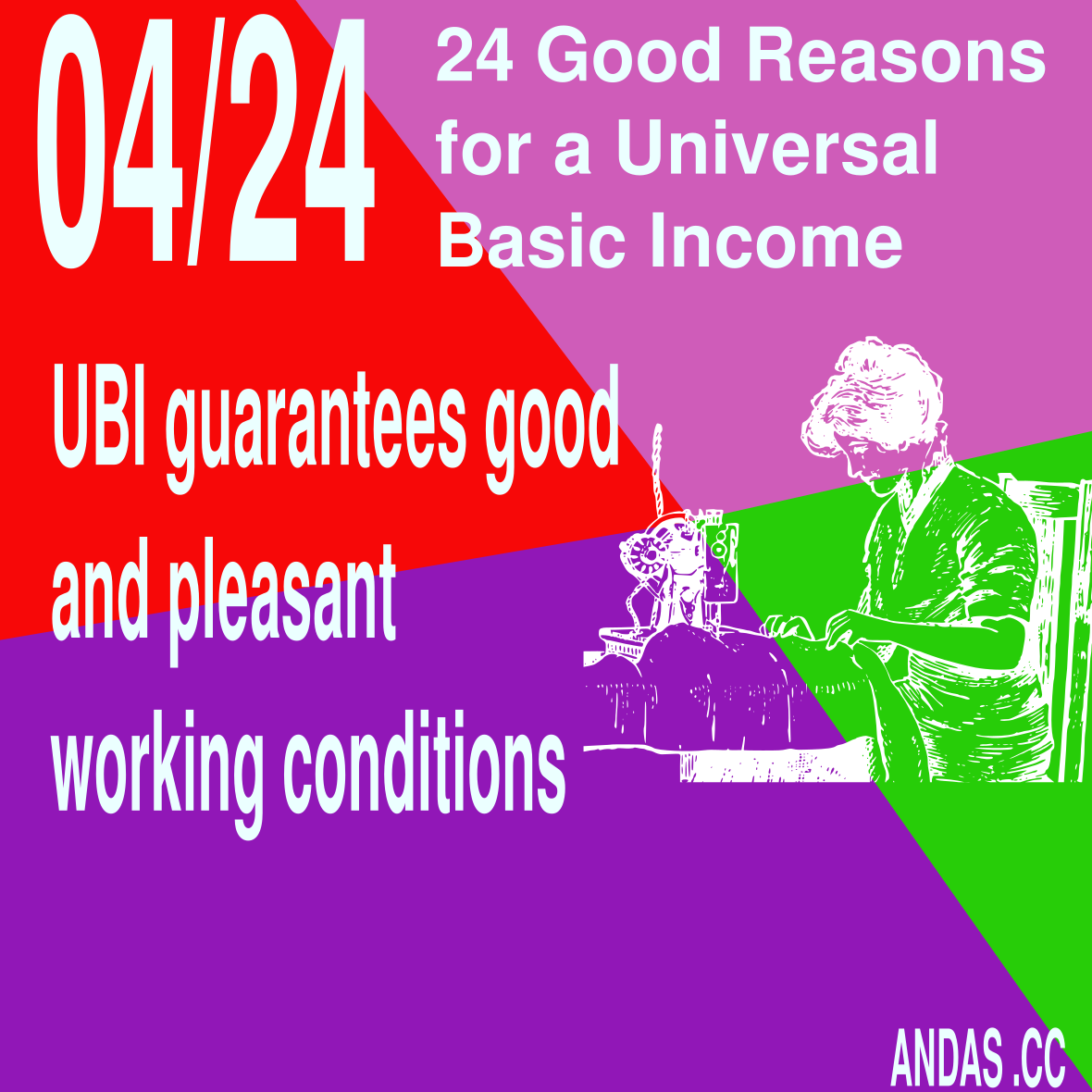
05 Redistribution from top to bottom
The rich get richer, the poor get poorer. In any case, it is important to take countermeasures. An unconditional basic income of a sufficient amount can only be financed with correspondingly high taxes. Taxes at a level that only the rich and large corporations can pay. Conversely, a basic income benefits those who currently have the least the most. A basic income is therefore in any case a massive redistribution from top to bottom. Who could object to that? Of course, a global basic income would be ideal here, because wealth and poverty are distributed very differently geographically.
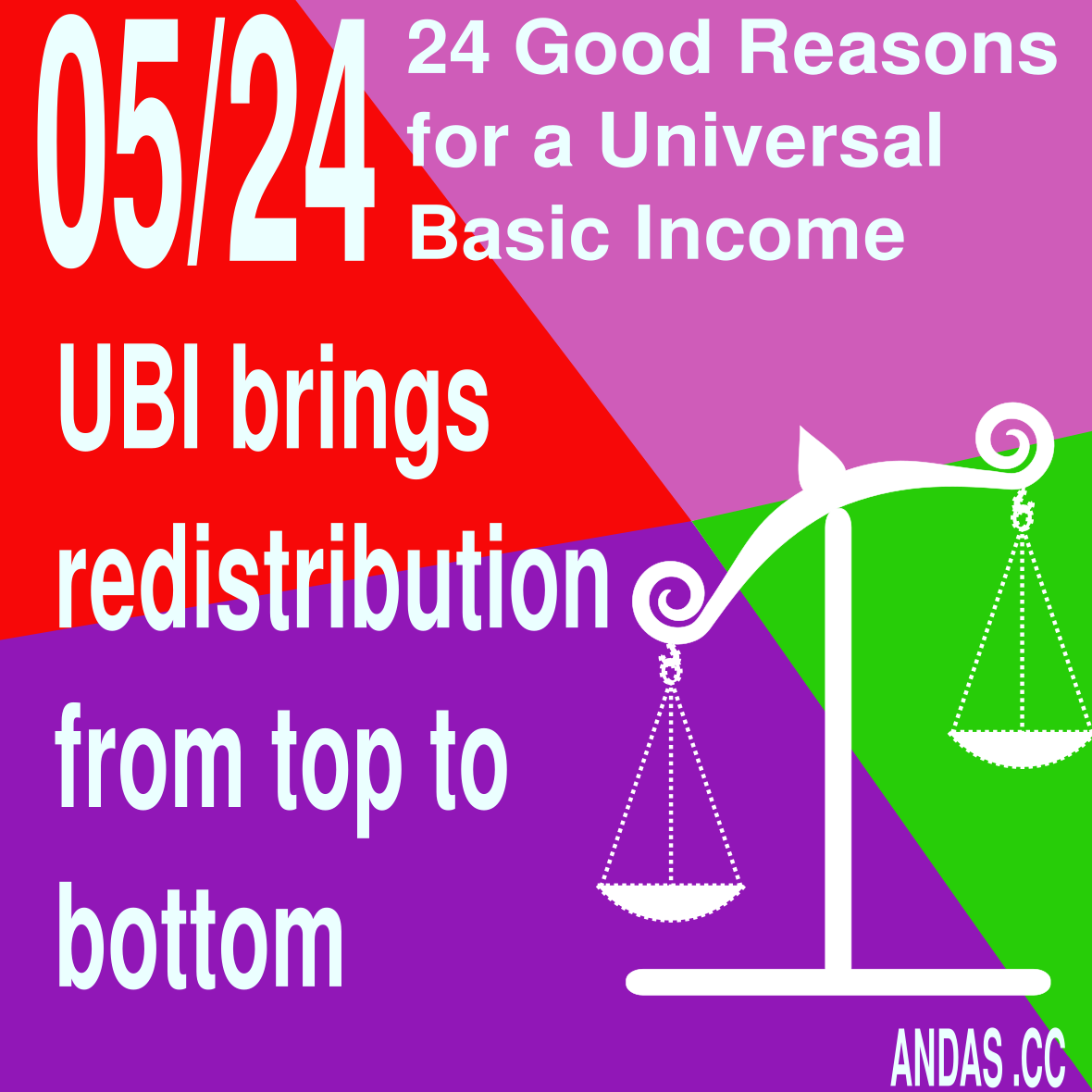
06 Freed from shame - basic income without means testing
The social benefits that people receive today are always linked to the condition of need. At the same time, the people who receive these benefits are also stigmatized. Often the recipients are even ashamed of it. They feel like they are not full members of society because they need special support. An unconditional basic income would end this humiliation. Everyone gets a basic income - just for being human.
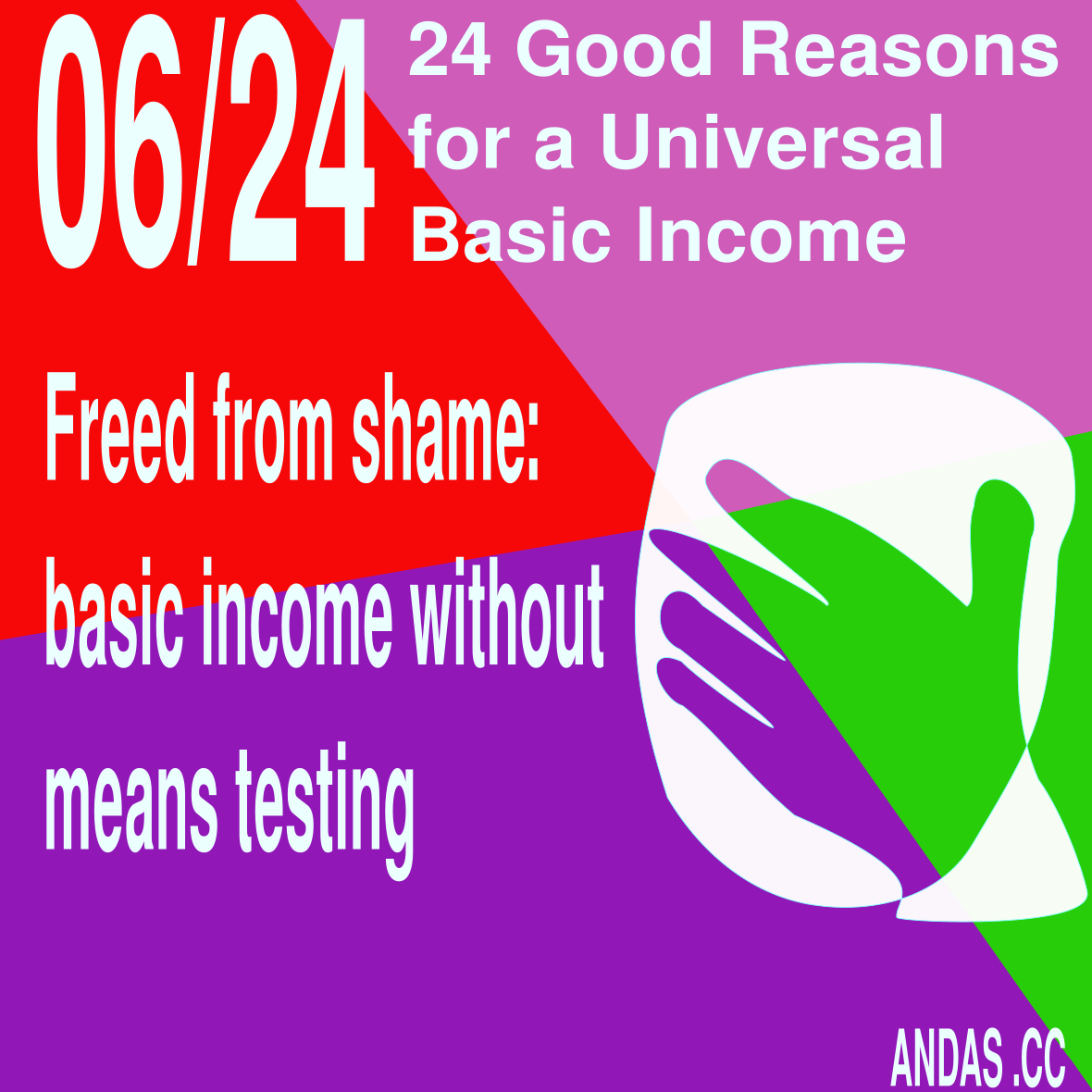
07 A motivating and positive utopia
In the grueling defensive battles against neoliberalism, many people have given up hope for a better life and are happy if they can just keep their (usually increasingly poorly paid) job. In contrast, an unconditional basic income again offers a positive utopia. Something worth fighting for instead of just always fighting against something.
Utopias still existed at the beginning of the workers’ movement, but we have often lost them today.
As Srnicek and Williams explain in their book “Inventing the Future: Postcapitalism and a World Without Work,” we need positive utopias and universally applicable rights again.
Universal Basic Income provides such an utopa.
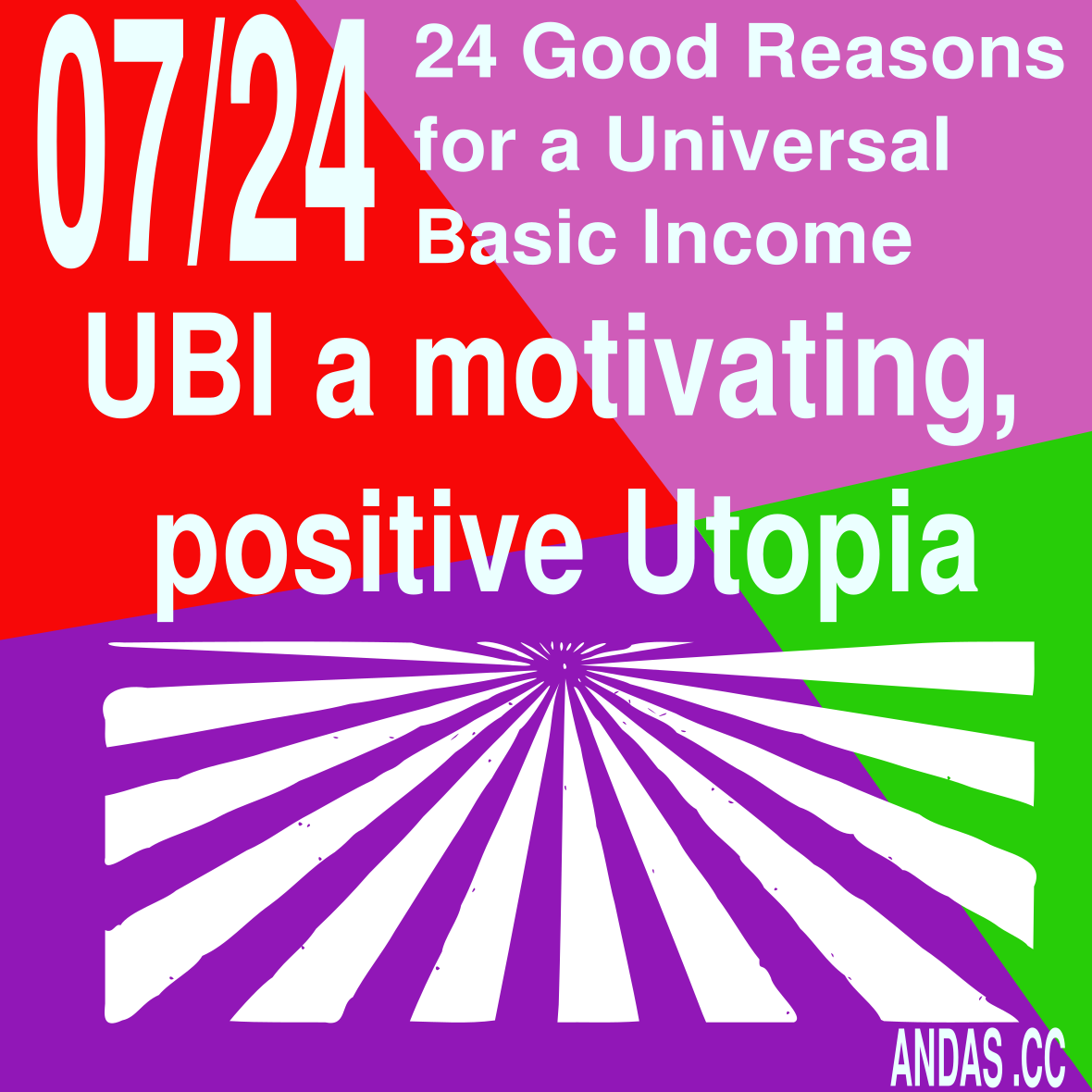
08 Helps to question the status quo
Many people can no longer imagine any other world. They think that there are no alternatives to the way the world is organized, or at least not desirable ones. Simply discussing the idea of a basic income helps to question the status quo. What could life be like if survival was not linked to gainful employment? What useful things couldn’t we do? Which products and services do we actually really need? How many pointless and harmful jobs are there? Why is social wealth so unequally distributed? Why do we have to constantly focus on further growth? What could a solidarity economy look like? How can we live ecologically, sustainably?
All questions that arise as soon as we seriously think about a basic income. That means: it’s not just the basic income that’s important: just the idea of it - just the discussion about it is helpful! It is not the case that a basic income would automatically solve all of these problems, but it creates space for alternatives and the mere fact that a “an other world” suddenly becomes possible makes it conceivable and the differences to the status quo become obvious.
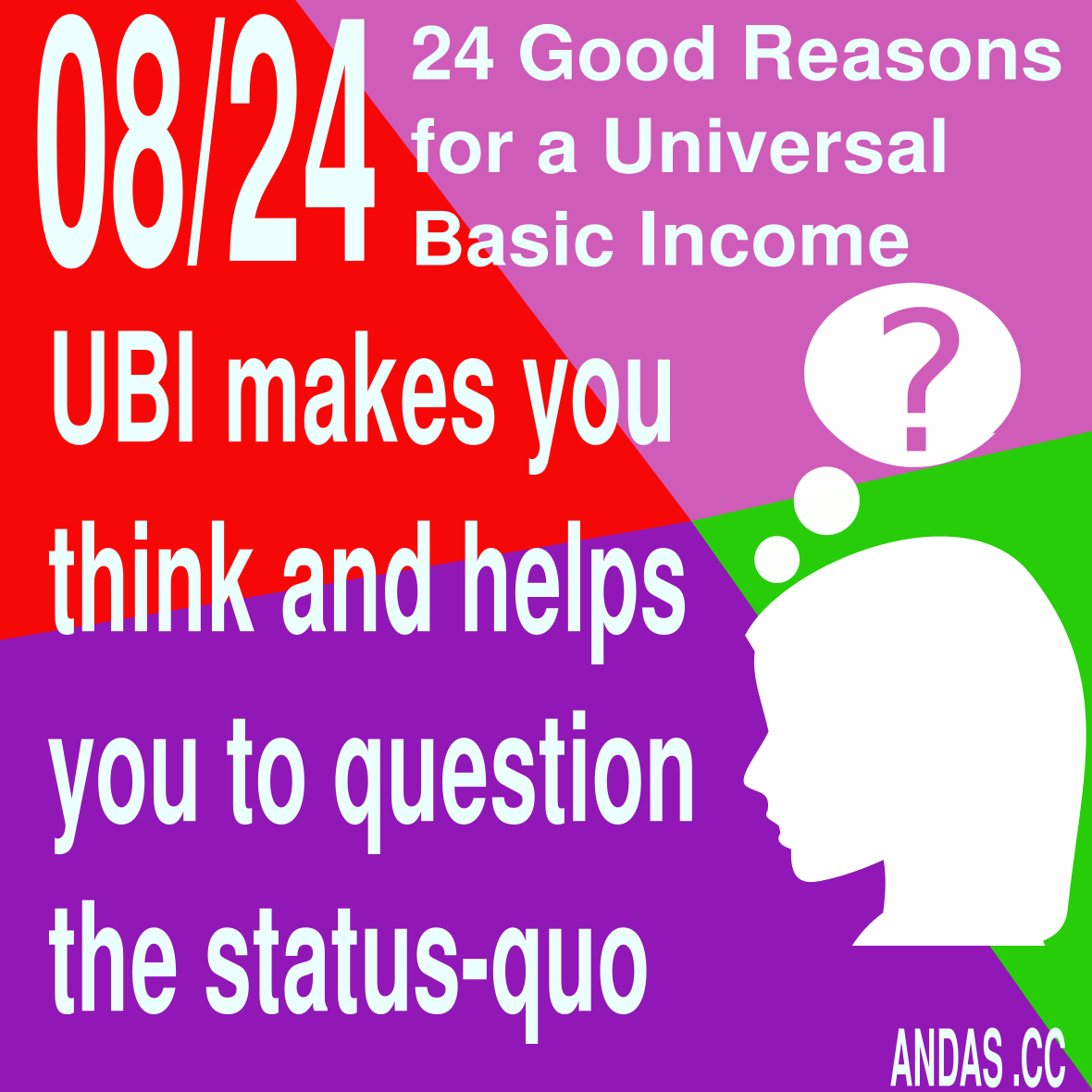
09 helps against bullshit jobs
“Bullshit Job” is a term coined by David Graeber for meaningless and useless jobs. Graeber saw this above all as the many useless jobs in the bureaucracies of large corporations. Today, however, entire industries and divisions are busy producing useless and harmful things. Let’s think about the advertising industry: It only has one product: our dissatisfaction. Then there is planned obsolescence: many products are unnecessarily short-lived and have predetermined breaking points. Or a patent attorney works all day to make something that is sensibly shared as widely as possible (knowledge) artificially rare by law. Armament and war, financial “products”, etc. If we take the ecological footprint into account, many jobs today are probably more harmful than useful.
An unconditional basic income would not automatically eliminate all bullshit jobs, but it would help a lot: since fewer people would then work, labor would become correspondingly more expensive and we would therefore have less pressure to create artificial scarcity. On the other hand, the basic income guarantees that there is always enough purchasing power for all basic needs. In addition, further legal measures would certainly be required: e.g. an advertising ban. An advertising ban would be difficult to implement today because we would immediately have all the people who rely on these jobs against us. With a basic income, no one would be forced to work a bullshit job.
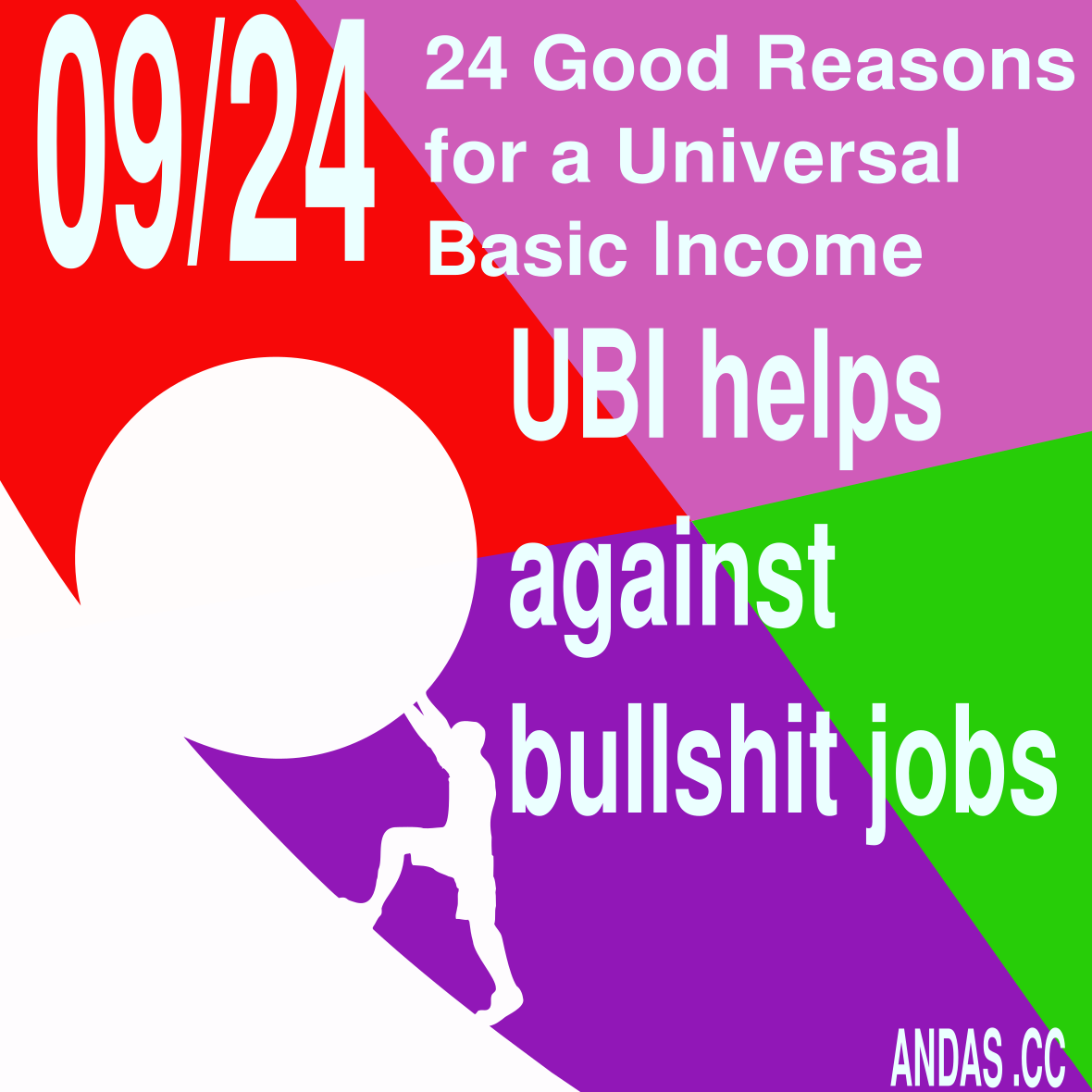
10 Unpaid work is finally going to be paid
A lot of the work that is done today takes place outside the realm of wage labor and is very often not paid at all.
Let’s think about housework, education and, above all, home care. This work is now very often done by women and is usually unpaid. This work is often unconditional - it has to be done because it is very often existential: a child who is hungry needs food and sick relatives need care. A basic income would at least create a little more justice here - because we all get paid.
The question is often asked: Who would still work with a basic income? The fact is that today a lot of work is done without income and this work is very often overlooked.
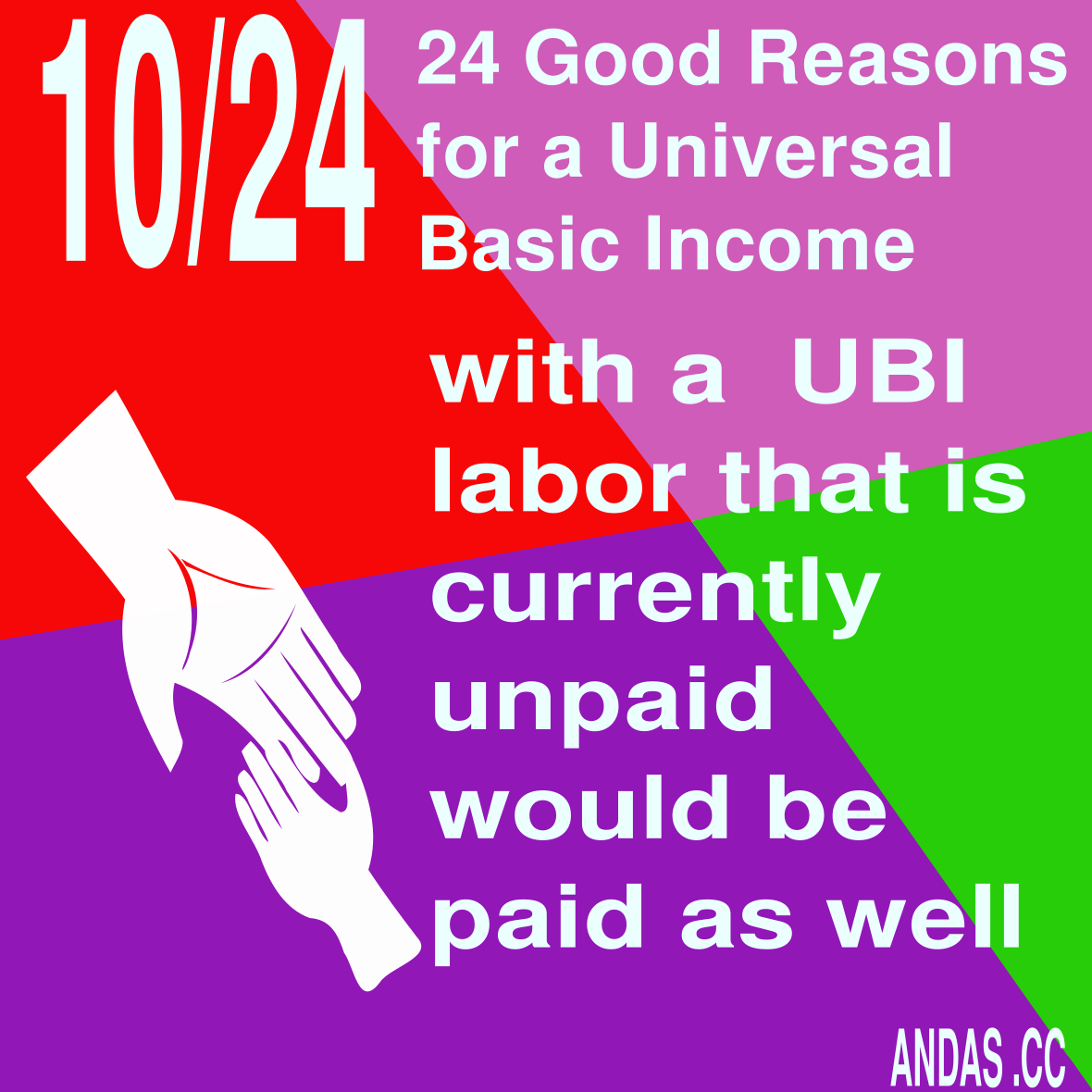
11 UBI is the only answer to digitalization and AI
We have all heard about digitalization, but many people underestimate the radical changes we will be facing in the coming years. Self-driving cars will very soon be commonplace. In a few years, no logistics company or cab firm will be able to afford to employ human drivers. How many activities are significantly less complex than driving a vehicle? Who still needs call center employees in the age of Alexa and Siri? Even activities that were recently regarded as typically human domains are not safe: composing music, emotions and creativity.
AI has made huge progress, especially in the last few months. ChatGPT and similar “large language models are only the beginnin”. In a few month we could have AGI - AI on human level. From then there is almost no job that is secure from being replaced by AI.
Many people still think that the upheaval caused by digitalization is comparable to the technological upheavals we had before and that the jobs that will be lost in one area will be created again in another area. But this is not the case. Even in IT, many colleagues are now fearing for their jobs because many things are being moved to the cloud. For ecological reasons alone, we cannot afford to create artificial bullshit jobs.
In any case, it is very likely that AI will lead to an enormous wave of automation in the next few years. This can either lead to mass unemployment and dystopia, or it can be the dawn of a golden age for all of us. Productivity is already so high that many of the jobs are just bullshit jobs. In any case, we need a way to make the social wealth created accessible to everyone. An unconditional basic income is the only realistically suitable project for this.
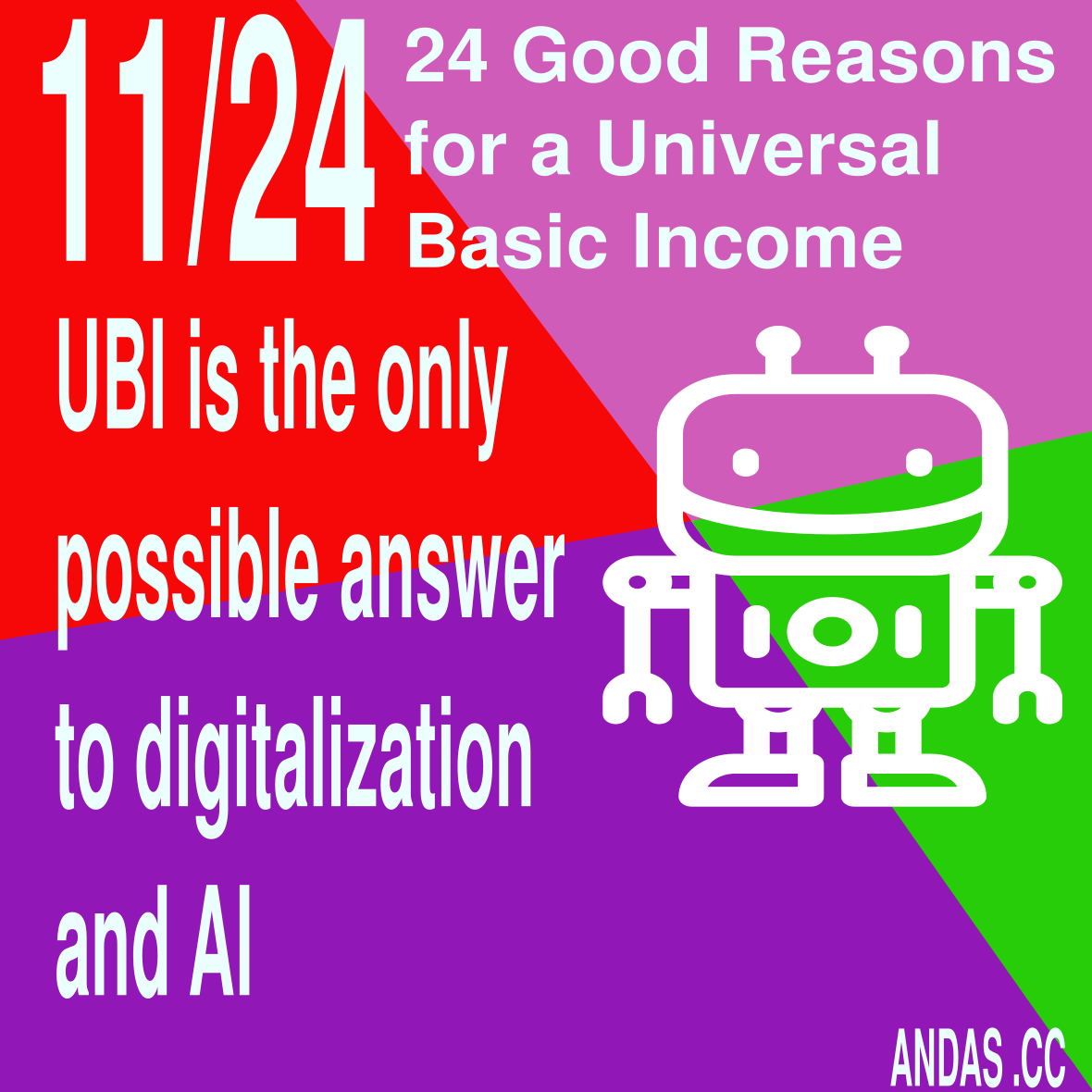
12 UBI brings a new understanding of labor
When we talk about work today, most people immediately associate it with wage labor. On the one hand, there is a lot of unpaid work that is done in the household and in care and then there is a lot of voluntary work. People develop free software and produce art and culture or are simply there for their fellow human beings. A lot of it is often more strenuous than traditional wage labor and a lot of it is also much more important and useful for our society.
The discussions that accompany the demand for the introduction of a basic income will help to rethink the concept of labor.
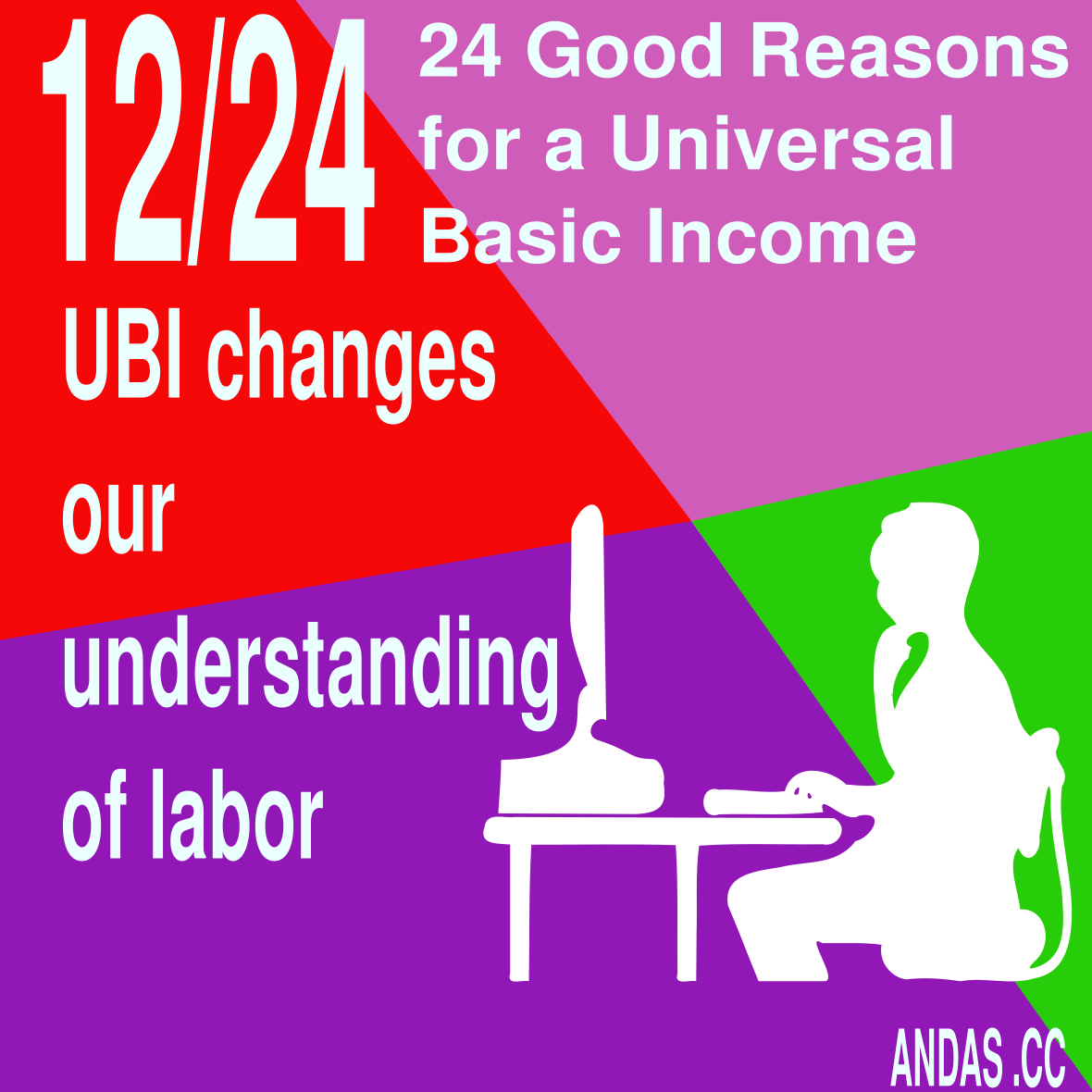
13 UBI helps against climate change
In order to reduce CO2 emissions, a very massive restructuring of our economy is necessary. Jobs will have to be cut, particularly in all CO2-intensive areas. Given the many bullshit jobs, the potential for savings is very large. There will probably be new jobs here and there in areas of green technologies, but overall a lot of jobs will be saved:
We need products that last longer and a widespread ban on advertising. With a lot more free time, it is then easier to live in a climate-friendly way in your private life. Why not grow tomatoes yourself? If you have a lot of free time, it’s no problem to go to the sea by bike and the entire leisure industry becomes obsolete. Conversely, taxing CO2 could be used directly to help finance a basic income.
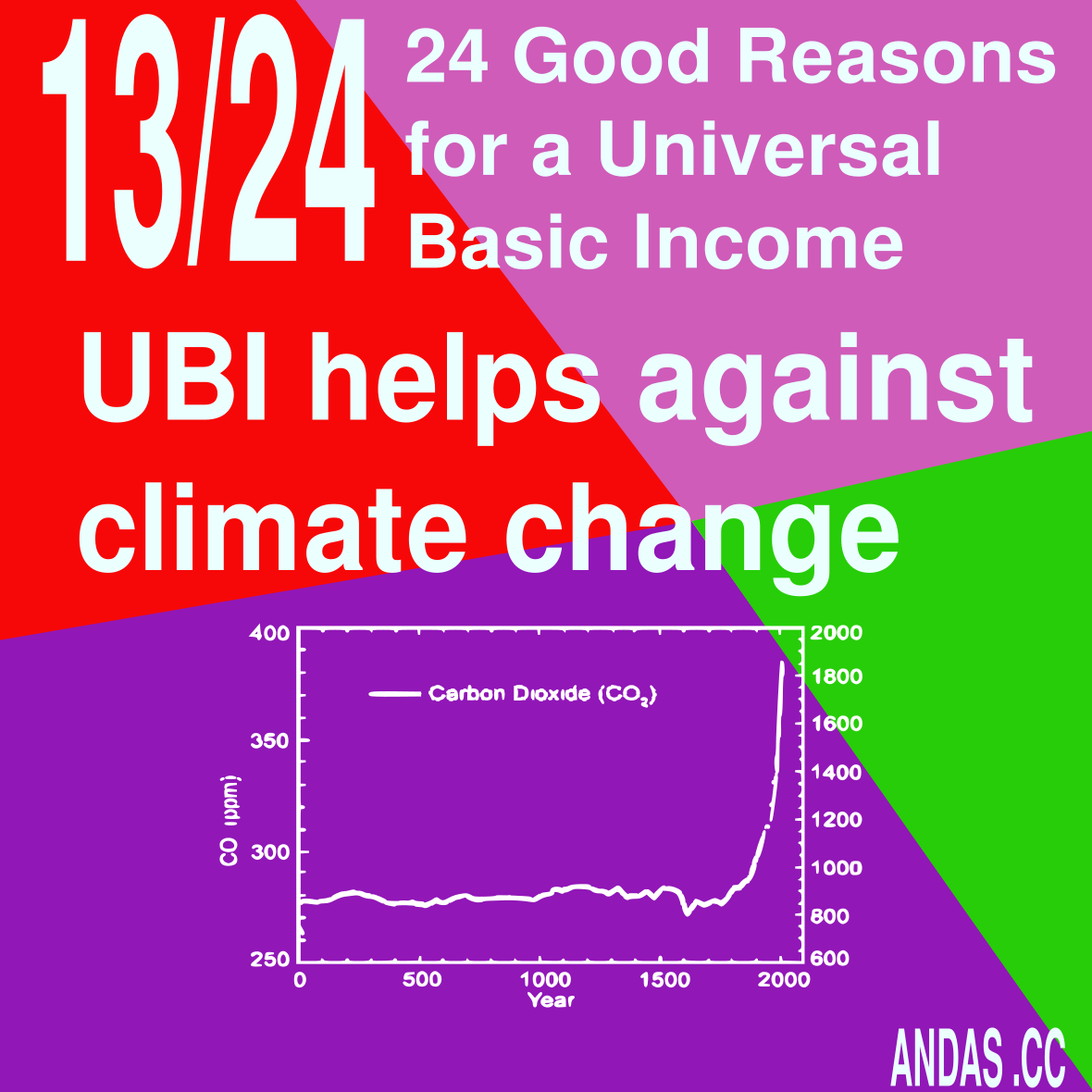
14 cuts the logic of unlimited economic growth
The growth logic is deeply rooted in capitalism: the capitalists who want to increase their capital have to reinvest most of it so that new industries are built.
Since our basic needs can be met with relatively little effort, growth creates more and more useless junk with the associated bullshit jobs. With a basic income that is high enough so that many people no longer prefer to do wage work, less useless things can be produced. Of course, capitalists still have the motivation to create artificial demand, but the options for doing so are at least somewhat limited. Corresponding tax increases should ensure that excess profits can be used to top up the basic income and not for excessive investments.
Taxes can also be used to disincentivice industries that are especially harmful or useless. E.g. taxing CO2 emissions, advertizing , and so on.
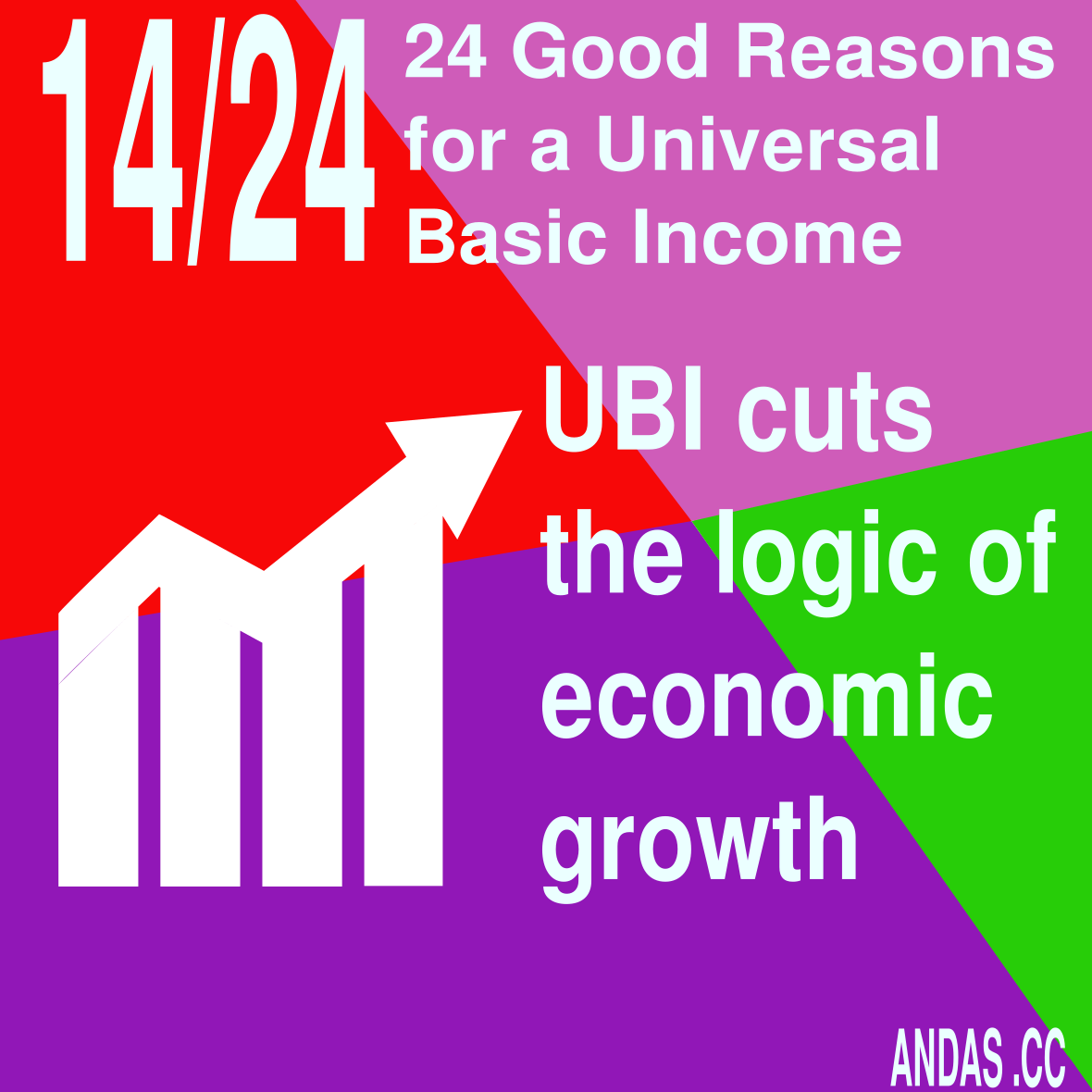
15 UBI brings fairer wages
Many very strenuous and unpleasant jobs are now very poorly paid, even though they are important for society. On top of the fact, that a lot of care work and labor in the in the house hold is not paid at all. Quiet office jobs, on the other hand, are often comparatively well paid.
With a basic income, strenuous and unpleasant jobs would have to be paid particularly well, otherwise people wouldn’t do them. This brings more fairness to the wages.
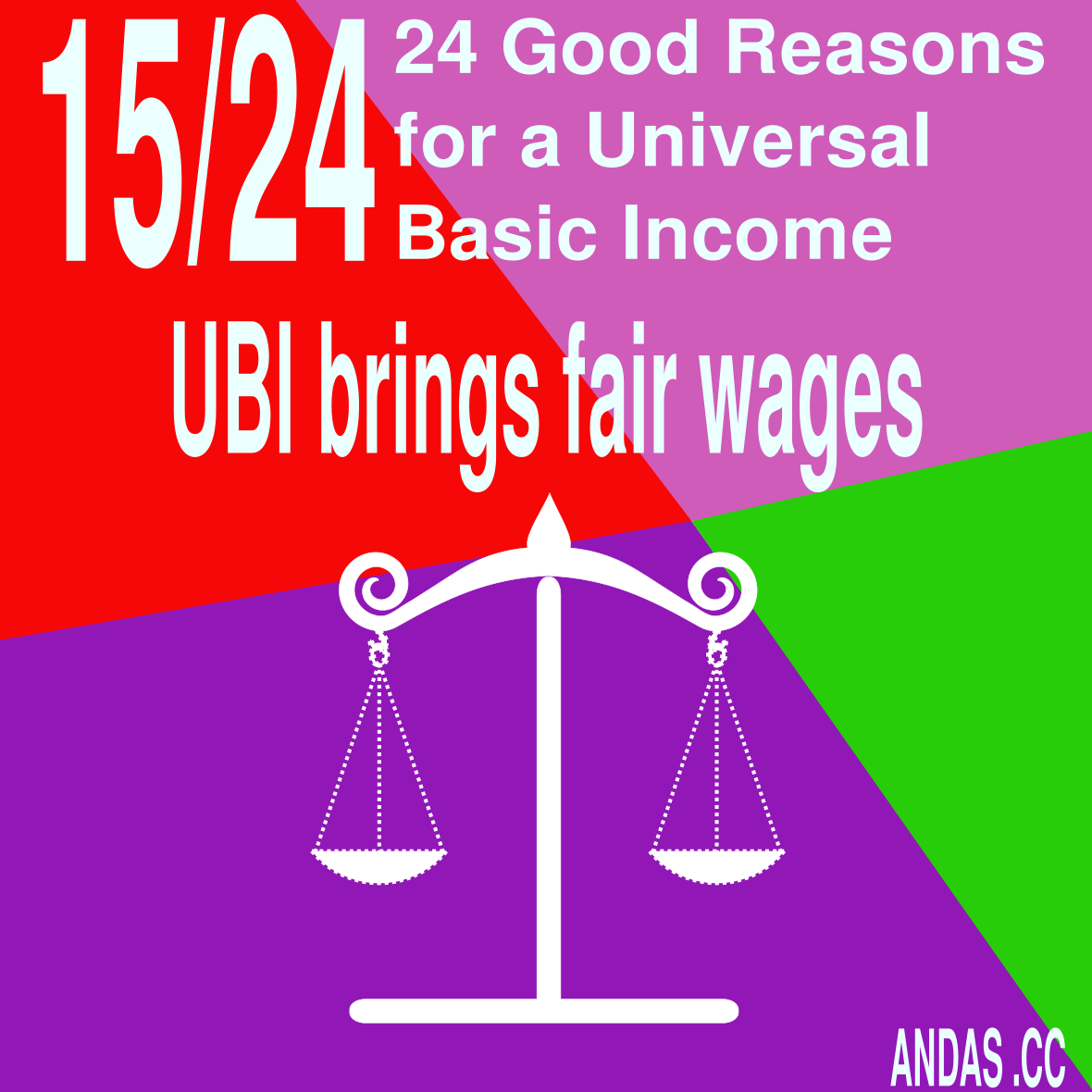
16 UBI conveys a different view of humanity
If we as a society decide to enable every person to live a secure life, then we also convey a different image of humanity: We convey that everyone is a valuable member of society simply by being human. With this advance of trust that we all receive, people’s image of society will also change. It is no longer a field of struggle for survival but suddenly something that conveys safety and security. This certainly motivates many people to prove themselves worthy of the trust and to do their best for society. So we have a positive feedback that positively changes our society and the people living in it.
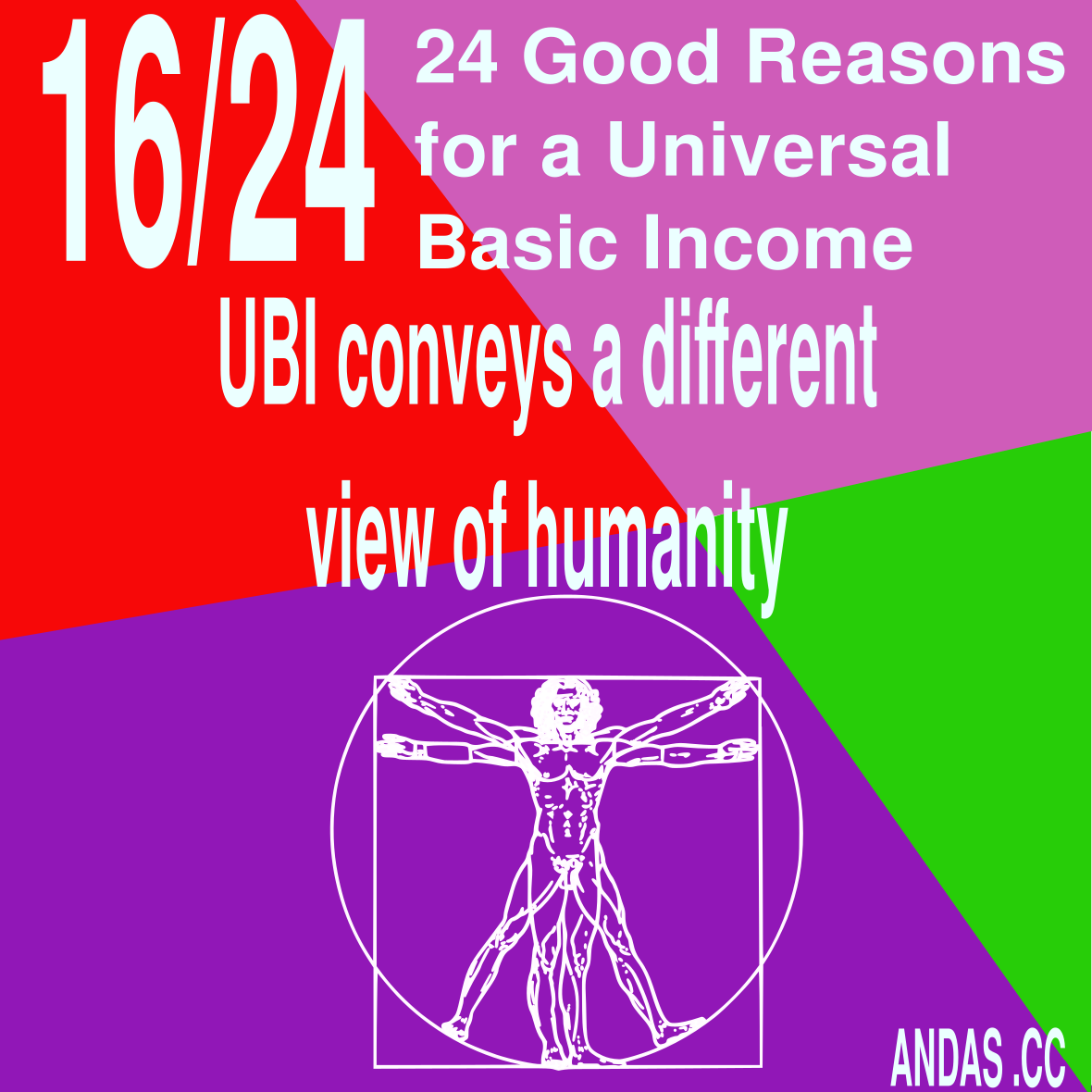
17 UBI enables personal development
What would you do if your material needs were secured? Renovating an old house? Learn an instrument and form a band? Grow tomatoes? Complete a course of study? Taking on an open source/free software project?
Many people would like to do something different in their lives, but in the constraints of everyday life between family and a 40-hour job, there is no time to do something fundamentally different: larger projects cannot be realized. The introduction of an unconditional basic income could unleash a gigantic potential for personal creativity and initiative, ultimately to the benefit of all of us.
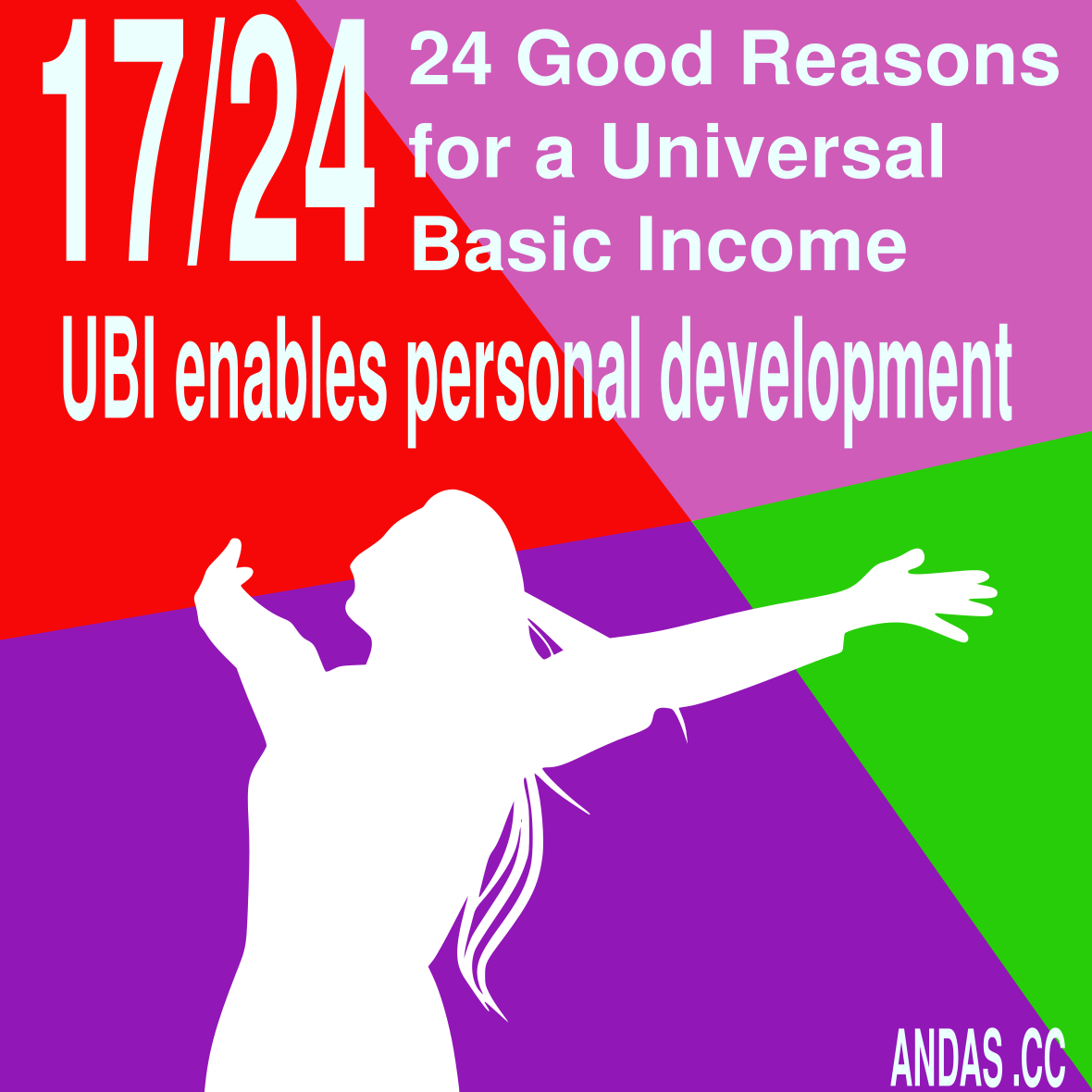
19 UBI enables a transformation of society
In the daily grind of everyday life, many people find it unrealistic or even impossible that we organize our society completely differently. For many, the idea of a “fundamental change” appears to be more of a threat. Even though it is recognized that many things are not going well today, many people are afraid that everything could get even worse.
A basic income would substantially improve this situation: With a basic income, the basic needs of everyone would be secured and the fear of fundamental changes would be eliminated. The possibility of operating an alternative economy in addition to traditional wage labor enables us to participate in this transformation: community gardens, commons-based production, the development of free software, research or the production of art and culture can suddenly be organized free of commercial constraints without any major central politics but entirely individual and grassroots democratic.
A basic income therefore has enormous emancipatory potential.
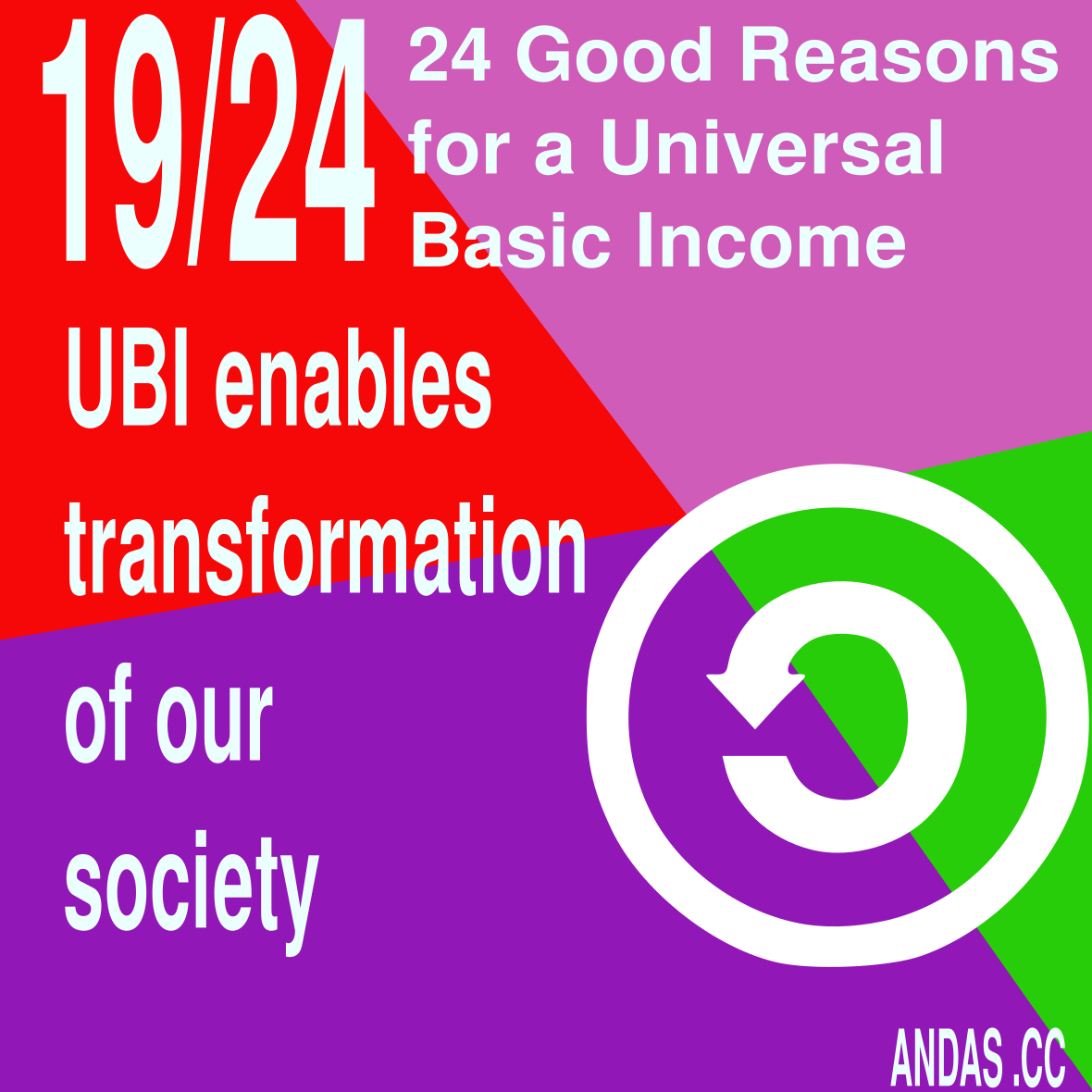
20 UBI ends the harassment of unemployed people
Even where unemployment benefits exists, they currently are not meant to sustain good live but are usually built in a way to force people back into the “job market”
Most of the so called “education” and “courses” offered to unemployed people hardly have the purpose of giving people sensible knowledge but exist for two reasons: Firstly, to improve the statistics (the people are then not considered unemployed but as “in training”) but above all to harass people in order to force them to accept wage work under the worst possible conditions. This brings cheap labor to companies. As almost always, politics here does what benefits the corporations.
A basic income would end this degrading treatment of the unemployed. With the financial security that a basic income offers, many people would certainly take the opportunity to further their education, but in this case in a self-determined manner and certainly with more meaning than what the job center has to offer.
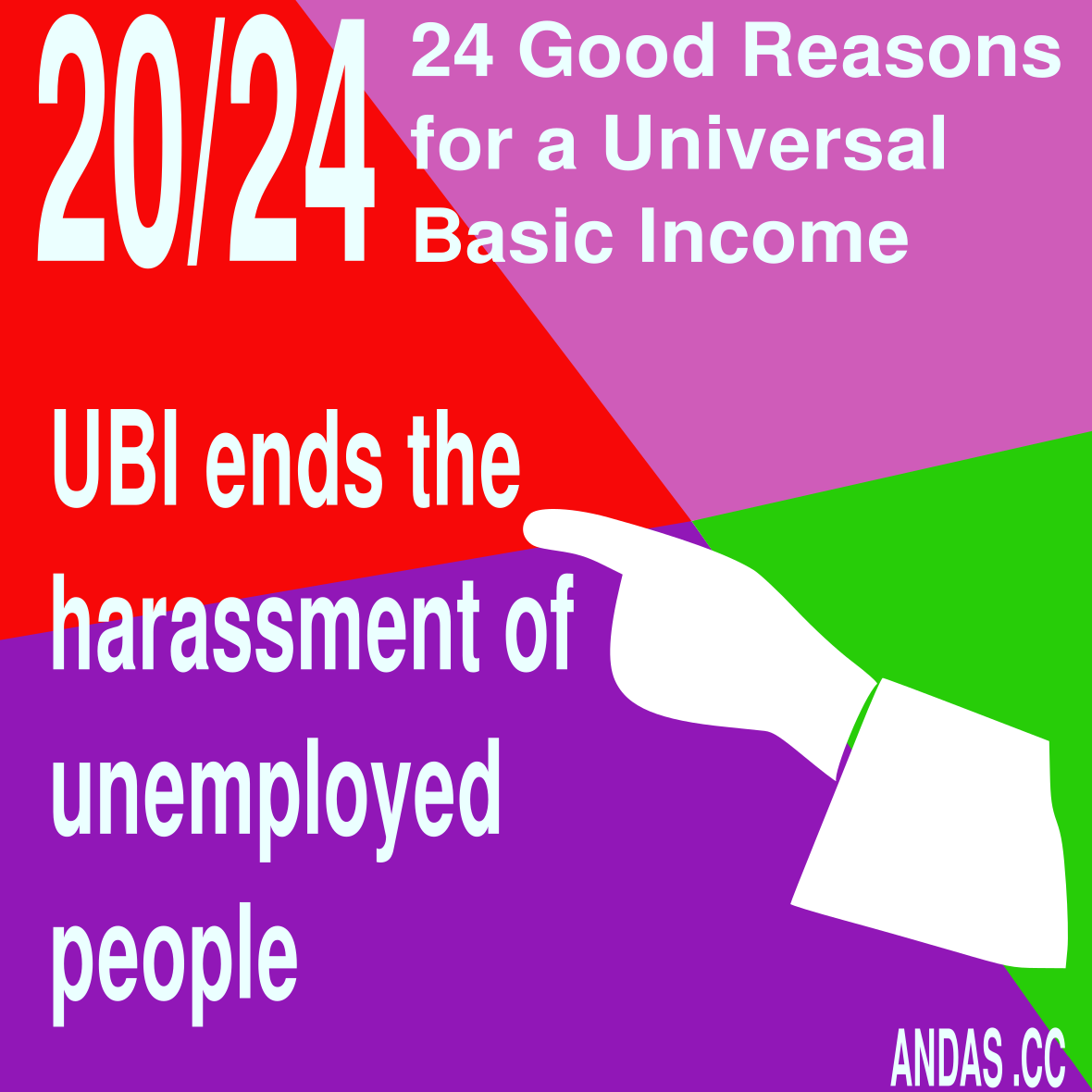
21 because the watering can works better then targeted benefits
Critics of basic income often argue that it would be better to award social benefits in a targeted manner. Of course, this is important as long as very few services are awarded overall, then it must at least be guaranteed that those who need it most get something. But even in a close-knit social network (and we are far from that) there are always people who fail because none of the targeted support applies, or because people cannot find their way through the bureaucratic thicket, or because they are too proud to apply for help.
Someone wants to take time out for education but is not supported because they are already too old? Etc, etc, ..
The watering can principle of basic income guarantees that no one slips through the cracks of the social network. Of course, there will always be special needs that cannot be covered by a basic income and no one wants to abolish these. But the fact that everyone gets something guarantees that those who need it most (because they have had the least so far) benefit the most from it. The son or daughter of the multimillionaire is also entitled to a basic income - but mom or dad also has to pay a lot more in taxes. This is clearly fairer than if the children inherited all of their parents’ assets tax-free.
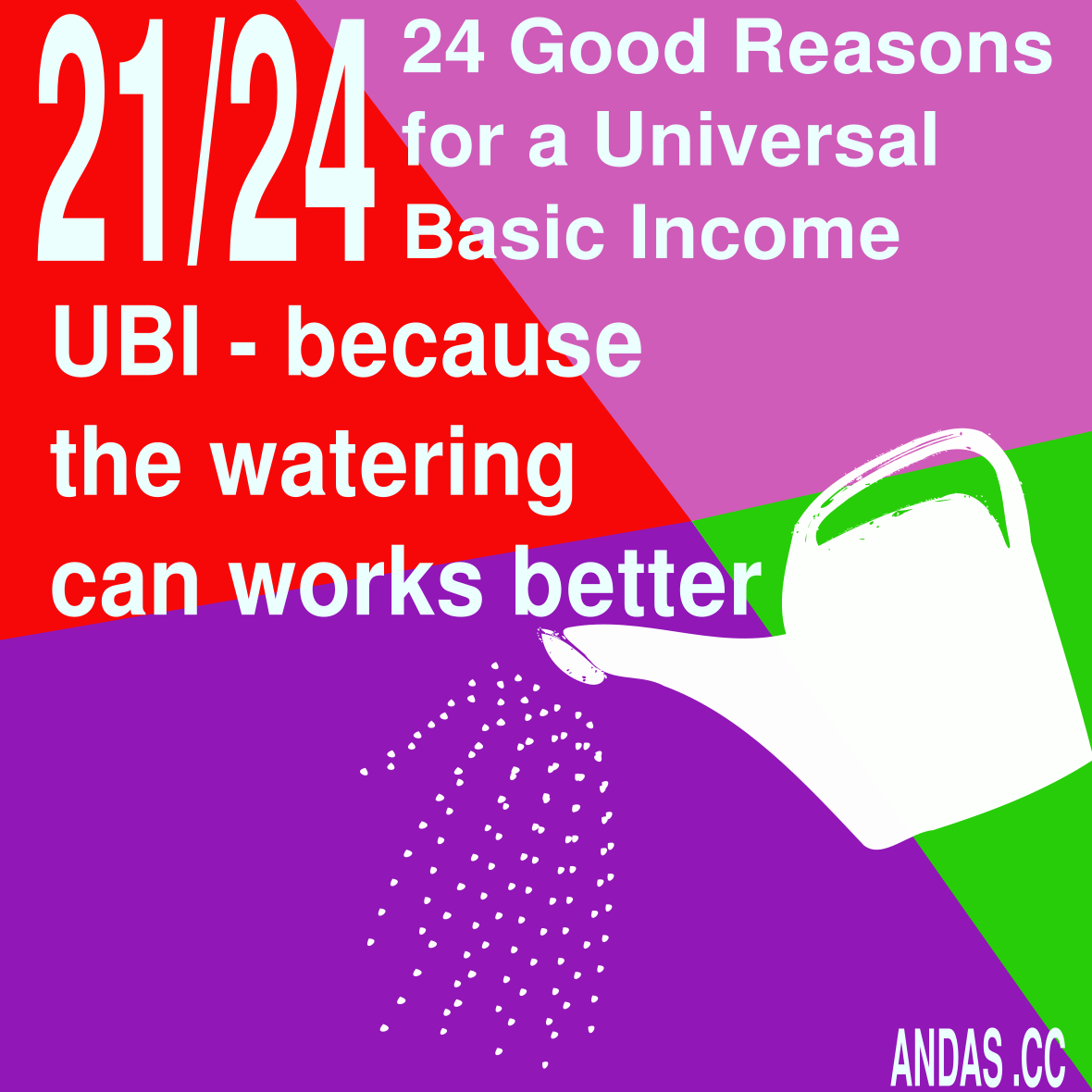
22 UBI - so we no longer align our actions primarily with economic interests
Anyone who can live on a basic income no longer needs to base their actions primarily on economic interests and can do what they think is right and good. Even those who continue to do wage labor no longer have to align themselves so closely with the interests of their employer, because it is much easier to quit at any time.
Many people no longer notice how much everything in our world is subordinated to economic interests. In many articles by journalists it should be noted that many paragraphs have no content and are only intended to fill the paper. The associated headlines are usually clickbait. Not only newspapers and media are affected, but also our entire culture. Adorno analyzed this development well. He talks about the cultural industry.
As Adorno famously said: “There is no right life in the wrong one.”
But at least, a basic income would be a good way to counteract this and create emancipatory spaces where profit is no longer the motivation for our actions.
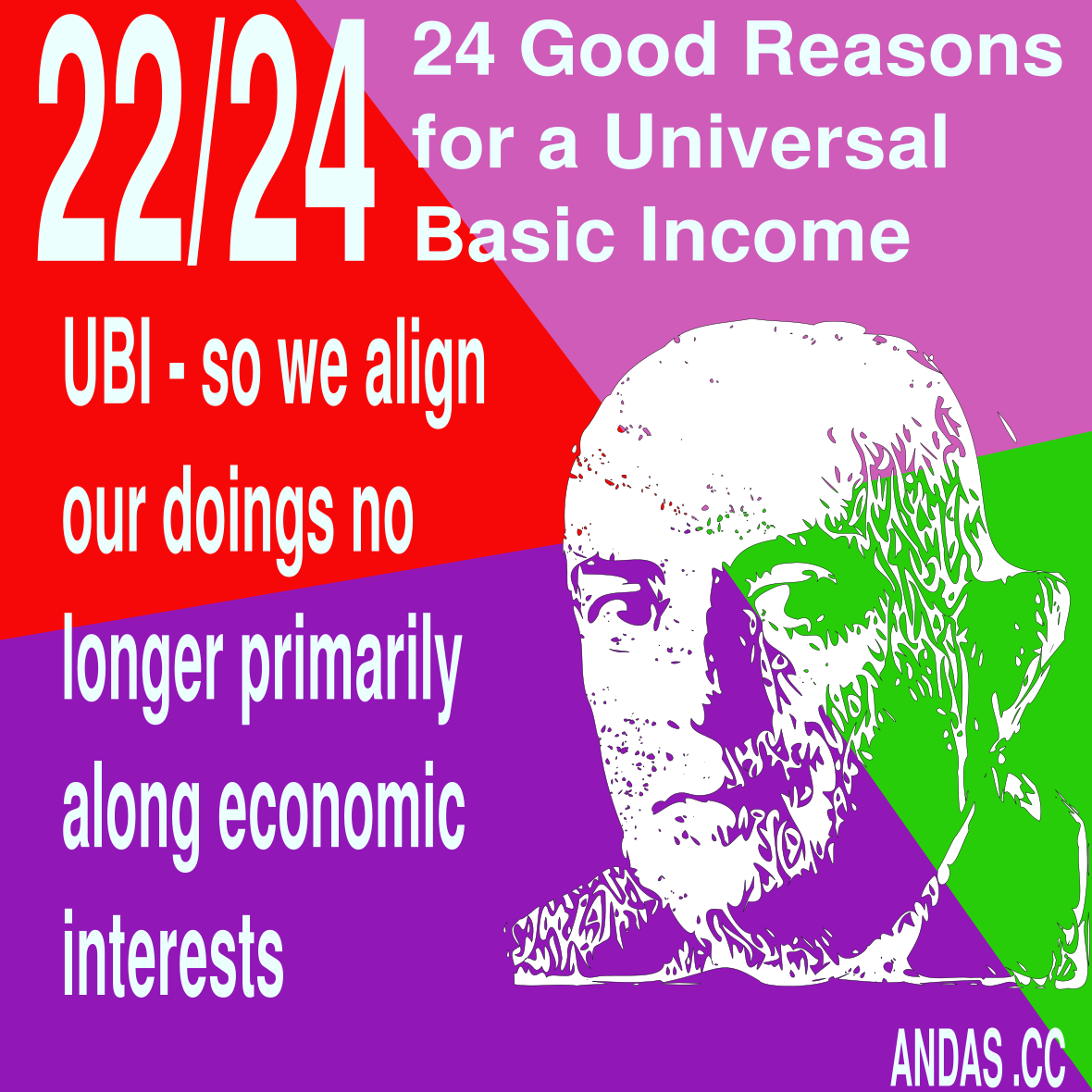
23 UBI allows for a personal “time out”
With a basic income, many people would probably look for meaningful activities beyond wage labor, others would prefer to continue working in conventional wage labor. But with a basic income it is easier to take a break. For leisure or relaxation and to reflect on life. This protects against burnout and helps you regain your strength. This guarantees that those who are in paid labor are actually motivated and productive and this effect alone could even lead to significantly higher productivity.
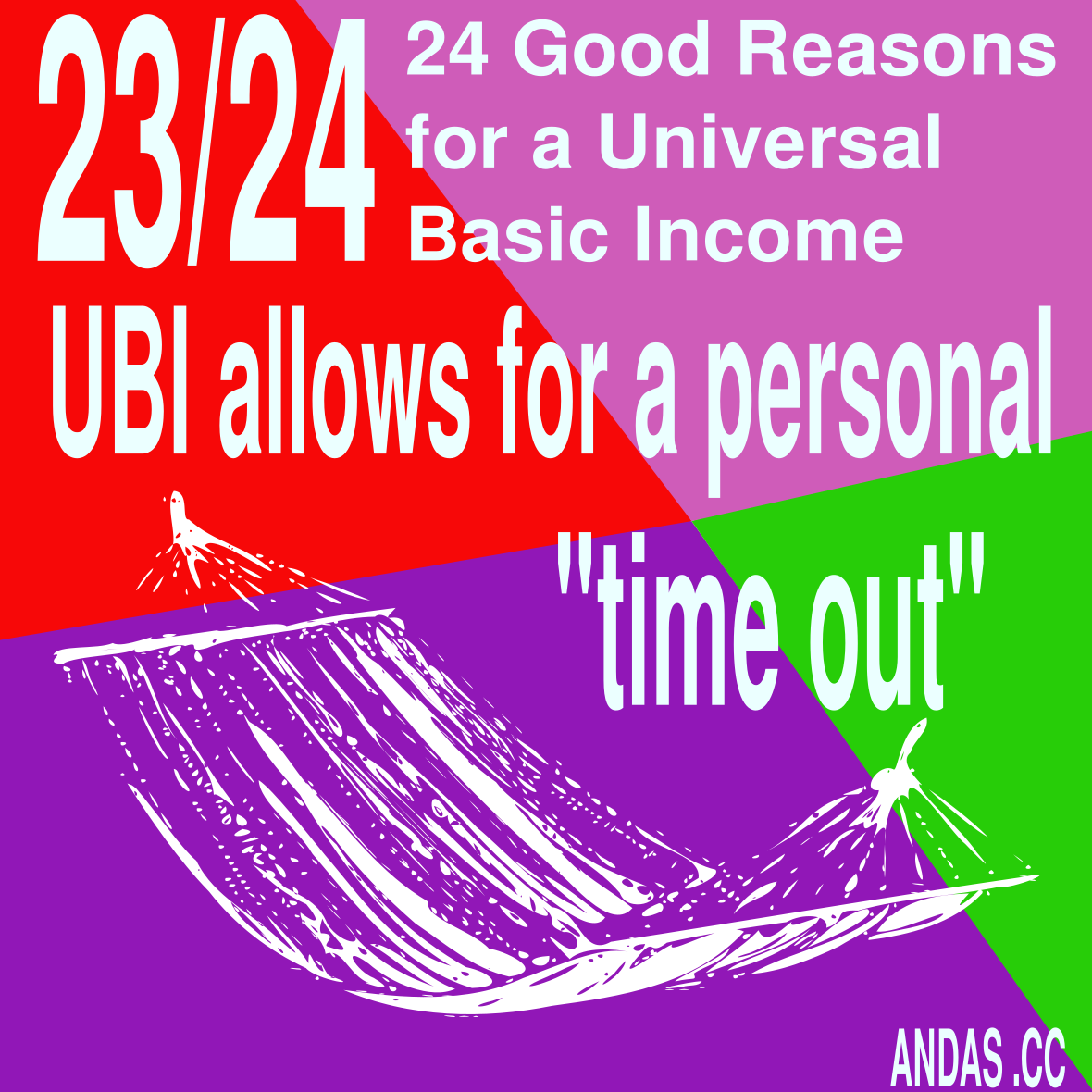
24 UBI attacks capitalism at its core
For some leftists, a basic income is not “revolutionary” enough. We have seen in the previous reasons, that a universal basic income definitely has the potential to transform society towards communism. A basic income undermines the most fundamental mechanism of capitalism. What is this mechanism? Many people think it’s the money. But money is just the lubricant. It is more likely capital and capital is usually not present in the form of money but rather in the form of ownership of factories and other so-called means of production. If we look more closely, it is not the capital but the capital relationship: that on the one hand we have the ownership of the means of production and on the other hand we have a lot of people who have nothing else to sell but their labor power. It is precisely this relationship that allows capitalists to buy labor and then transform it into surplus value. This is the core of capitalism and this is exactly where the basic income comes in: It changes the second part of this equation: people are suddenly no longer forced to sell their labor at any price and thus the capitalists’ capital is immediately devalued: it is not so easy to propagate anymore. This is elegantly expressed in a footnote in the first volume of Capital:
First of all, Wakefield discovered that in the Colonies, property in money, means of subsistence, machines, and other means of production, does not as yet stamp a man as a capitalist if there be wanting the correlative — the wage-worker, the other man who is compelled to sell himself of his own free will. He discovered that capital is not a thing, but a social relation between persons, established by the instrumentality of things. Mr. Peel, he moans, took with him from England to Swan River, West Australia, means of subsistence and of production to the amount of £50,000. Mr. Peel had the foresight to bring with him, besides, 300 persons of the working class, men, women, and children. Once arrived at his destination, “Mr. Peel was left without a servant to make his bed or fetch him water from the river.” Unhappy Mr. Peel who provided for everything except the export of English modes of production to Swan River
– Karl Marx, “Das Kapital”
The fact that the basic income attacks capitalism at its core is both good and bad news: on the one hand, it means that the UBI has the potential to overcome it, but on the other hand, it also means that this will not be possible without resistance: that we will face strong resistance against the introduction of a UBI from the capitalist class. Despite all the lip-service of the rich tech tycoons, these people know very well that this is a real deal. So a basic income will not just come to us. We have to fight for it too. And when a basic income comes along, those in power will try to design it in such a way that it is stripped of all emancipatory elements.
Of course, “attacking at the core” does not necessarily mean “automatically overcoming”. As already said: the UBI creates conditions in which many things can be easily changed. Capitalism itself is a very complex and adaptable system and as Adorno said: “there is no right in wrong”. On the other hand, there are certainly ways that can lead us out of this system. The unconditional basic income is one of these ways.
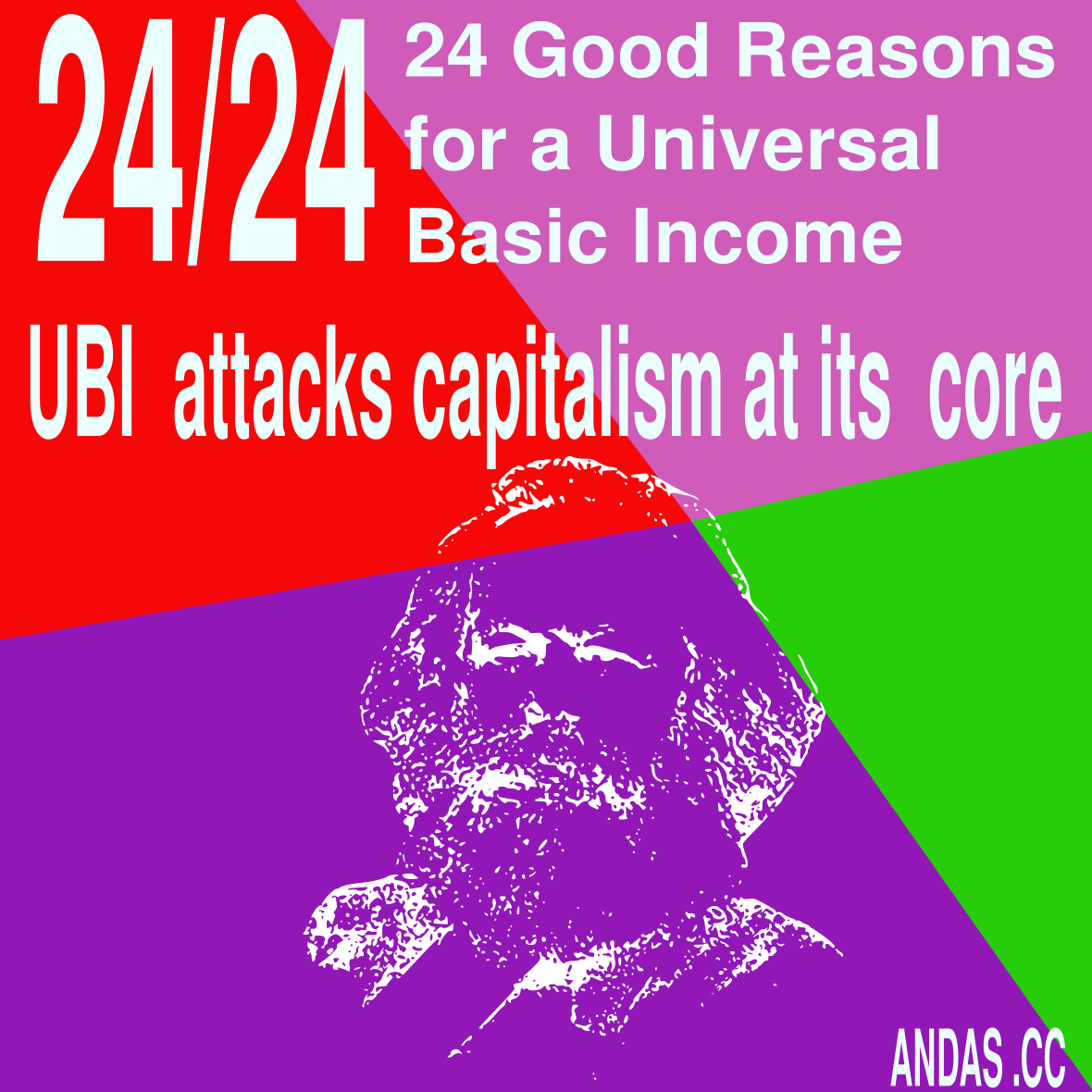
Links
24 Good Reasons for a Universal Basic Income (podcast index) or use (Podcast (RSS):)
Youtube Playlist: 24 Good Reasons for a Universal Basic Income (UBI)
(Original German Text: 24 Gründe für ein Bedingungsloses Grundeinkommen )
Initial Version: 2024-12-01 Last change: Feb 15, 2025
